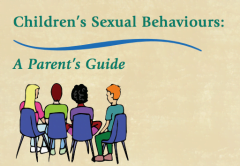Tackling a Tough Issue: The PEI Parent’s Guide to Children’s Sexual Behaviours
 Sex is a very tricky subject for us to tackle when we’re aiming to infuse culture. What IS normal, healthy sexual behavior? Who decides what’s normal? If something is normal, is it also healthy? Is there a slippery slope when it comes to sexual morality or is that just a figment of the imagination of the sexually repressed to spoil other people’s perfectly legitimate sexual fun? So many questions!
Sex is a very tricky subject for us to tackle when we’re aiming to infuse culture. What IS normal, healthy sexual behavior? Who decides what’s normal? If something is normal, is it also healthy? Is there a slippery slope when it comes to sexual morality or is that just a figment of the imagination of the sexually repressed to spoil other people’s perfectly legitimate sexual fun? So many questions!
You can hardly turn on the news these days without hearing about some new (or in many cases, old!) case of sexual offence, often involving the abuse and exploitation of children by a person in a position of authority or trust. As a society we take the protection of our children very seriously. We are shocked and horrified by any sexual abuse of children. It’s a difficult subject to broach…
As Christians, how do we speak God’s wisdom and word in the public square? How do we advocate for justice for the vulnerable? When and how do we speak to our elected representatives about moral issues so that our concerns can be heard? Within a multi-cultural and pluralist society, how can we bring our faith to the table where policies are made to align with “secular values” so as not to favour any one faith perspective over others?
I recently became aware of a brochure that the PEI Child Sexual Abuse Advisory Committee has updated and expanded, called Children’s Sexual Behaviours – A Parent’s Guide (2013). The purpose of the brochure is “to provide parents with information to help determine whether their child’s behaviour is normal and healthy, or a sign that something may be wrong.” It deals with preschool children (up to age 5) and Kindergarten Through Fourth Grade (in other words, children from birth through age 9).
The brochure, which is being distributed throughout the province, has created quite a stir. You can read a recent article about the whole issue here. But before you go any further, why not look at the brochure for yourself? You can find it here.
Here are a few things that concern me about this brochure:
- The statement in the first paragraph that “sexual behavior in children peaks between the ages of three and six” (a statement from a 1991 study of “Normative Sexual Behaviour in Children”). No explanation is offered as to what this means and it seems to me that this could be confusing for the average parent.
- Throughout the brochure there is an underlying assumption that what is “normal” or “natural” is also “healthy”. This is highly problematic and I suspect it’s not really what the authors mean. For instance, in the chart which describes behaviours for preschool children (up to age 5), under the column heading “Natural and Healthy” we find “touches the ‘private parts’ of familiar adults and children with hand or body.” However, under the column heading “Of Concern” it says “Touches/rubs the ‘private parts’ of familiar children or told adults after they have been told consistently not to do so.” Thus, it appears to me that somewhere between column one and two, a parent should tell children that such behavior is NOT appropriate.
- In paragraph 3, we read that “it is important to keep in mind that there are no absolutes. Normal, healthy behavior covers a wide range and may not be expressed the same, or to the same extent, in every child.” To say that there are no absolutes seems to imply that there is no behavior of any child that could be considered absolutely good or absolutely bad (right or wrong). Again, if this is really what the authors mean, there is internal inconsistency within the brochure.
- The brochure notes that “around age six, children develop more of a sense of privacy, such that adults are less likely to be aware of their sexual behavour…. As children learn cultural standards these interests are concealed.” I wonder, first of all, if 6 year olds really think of their behavior as “sexual”? The authors seem to talk about “touching private parts” and “masturbating” interchangeably. But are they the same thing? For me the term masturbating should be reserved for intentional sexual touch that leads to sexual gratification. It is not touch out of curiosity or even for comfort.
- Every society must socialize its children so that they learn what is appropriate and acceptable behavior in all kinds of areas. And a healthy society doesn’t just want children to conceal those behaviors that are “inappropriate” – we want them to STOP doing them. Take stealing for example. Many children at some point take something that doesn’t belong to them – they steal a piece of candy or a small toy from a store. The message that parents give them in our society is that “stealing is wrong”. We don’t (hopefully) expect them to just become better thieves so that they don’t get caught!
- In terms of how parents ought to respond to children’s sexual behavior, the authors say “A parent or caregiver’s reaction to a child’s sexual behavior is important for the child’s well-being.” No argument there, but it seems that this would be a good place to state unequivocally that a parent or caregiver should use this opportunity to help the child learn what is appropriate (as opposed to what may be “natural”).
- There is a list of principles that can guide parents or caregivers in their response to a child’s sexual behavior – try to figure out what happened, do not overreact, remain composed, ask questions, stop the behavior, don’t punish, redirect the behavior, educate the child, and do not ignore. Much of the information in this section is probably good advice. The one that disturbs me is the detail provided under the heading “Stop the behavior”. Here it says:
If children are masturbating in public or in front of others, explain to them that it is not appropriate to touch their private parts in public and that if they feel they need to touch their private parts they need to do it in private, hence ‘private parts.’ Children should not be told that it is ‘bad,’ ‘dirty,’ or ‘nasty’ when found masturbating and they should not be punished.
I may be old school, but I don’t think that it is good advice to tell a 6 or 7 or 9 year old child that they should masturbate in private!
It’s not clear to me exactly how this brochure is to be used. It’s called A Parent’s Guide but exactly how will it get into the hands of parents on PEI?Will it be available in doctors’ offices and health clinics? Will it be sent home with children from school? Will it be mailed out to households across the province?
If you are concerned about this brochure, and especially if you live in Prince Edward Island, why not contact your MLA (you can find their contact information here). And when you do, here are some suggestions for how to engage them on this issue:
- Be respectful and polite. If you want to have a productive dialogue, avoid strident language and tone. Give your MLA an opportunity to explain their perspective.
- Express your concerns clearly and without exaggeration – have a few “talking points” to help you stay on track (and remember that Christians are often assumed to be reactionary, prudish and out of touch with reality – try not to reinforce those stereotypes!).
- If you speak to your MLA by phone or in person make sure that you really LISTEN to his or her response. If you send an email, invite a return response.
- Remember that the Legislature is not there just to represent only you and your perspective, but you do have the privilege (and even the responsibility) of having a voice.
- You may wish to identify yourself as a Christian and quote Scripture but make sure that you have your facts straight on the issue at hand and realize that policies will not be made or modified based solely on what the Bibys (or any other holy book) says. Sometimes it’s best to understand the truth and wisdom of Scripture and then translate it into a language that will be heard and accepted in the public square.
When it comes to Infusing Culture, these are the tough issues that come up. We need to have our wits about us and find ways to bridge the growing divide between our faith and the public square. Be of good courage. In John 16:33 (NIV) Jesus says “I have told you these things, so that in me you may have peace. In this world you will have trouble. But take heart! I have overcome the world.”
There is a way forward. We are ambassadors of the Kingdom. We can’t claim to infuse culture if we never show up in the public places where decisions are made and tensions are resolved.
